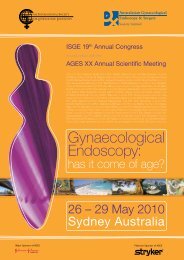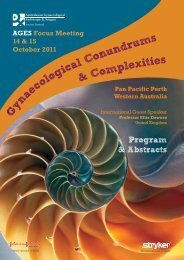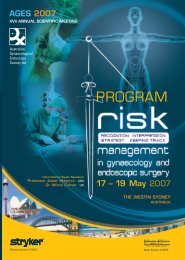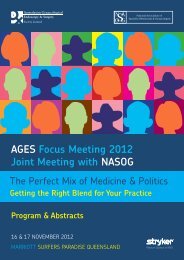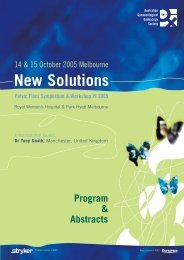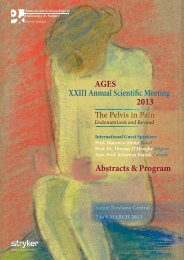16<strong>ABSTRACT</strong>S continuedFRIDAY 21 NOVEMBER 2008EFFECT OF OBESITY ON FERTILITYFriday 21 November / Session 7 / 1045-1105Hart RThis presentation will describe the adverse influence ofbeing overweight on the chance of natural conception,the effect of obesity upon the success of assistedreproduction, its influence on the chance of miscarriageand a brief mention of the adverse pregnancy outcomesrelated to obesity.Author Affiliation: R Hart, Associate ProfessorReproductive Medicine, School of Women's and InfantsHealth, the University of Western Australia. King EdwardMemorial Hospital, Subiaco, WA, Australia.MINIMALLY INVASIVE SURGICAL OPTIONS FOR THETREATMENT OF OBESITYFriday 21 November / Session 7 / 1105-1125Chandraratna HObesity is the plague of the 21st Century. It’s true causeslargely unknown, it’s promoters obvious and despite awide array of treatments it persists. It’s secondary effectsspill over into every field of medicine and it is a rapidlyincreasing cause of infertility. Because of this everydoctor today needs to be familiar with it’s associatedmorbidities and have an understanding of the treatmentsavailable. Surgical management has been shown to bethe only reliable sustained method of weight loss, but theoperations performed subtly change physiology anddoctors need to account for this when managing patientsperi-operatively.In this talk we will cover the causes and surgicaltreatment options available for obesity, and how nonobesity surgeons should manage patients who are obeseand also those who have had a surgical intervention. Wewill also cover the relationship between obesity andinfertility and management options to achieve asuccessful pregnancy.Author Affiliation: Dr H Chandraratna. University of NotreDame, Freemantle, WA, Australia.EARLY OVARIAN CANCER AND BORDERLINE TUMORSFriday 21 November / Session 9 / 1350-1410Salfinger SRequests for preservation of fertility are most common inyoung women with ovarian tumors of low malignantpotential or nonepithelial ovarian cancers. Fertilitypreservation is also an option for women with stage IA EOC.It should be remembered that this treatment should beregarded non standard and limited data is available tobase advice upon. Conservative surgery such as USOshould be accompanied by full surgical staging includingwashings, omentectomy, appendicectomy and possiblynode biopsies. Thorough laparotomy with exploration andbiopsy of any suspicious areas is also required andendometrial sampling should be performed. A review ofstudies of women with early stage epithelial ovariancarcinoma who underwent conservative treatmentincluded 282 women and 113 deliveries. There were 33relapses and 16 disease-related deaths. Studies ofwomen having fertility conserving surgery forgynaecologic cancer have shown that only 50% evenattempt to become pregnant.Low malignant potential or borderline tumours have anexcellent prognosis. USO or even cystectomy may beconsidered. Any visible disease should be removed. Sometrials have shown an increased incidence of cyst rupturewith laparoscopic surgery but the implications onrecurrence rate is unclear; there are no RCT’s assessingthis. The appendix should always be removed in patientswith mucinous tumours. Frozen section diagnosis may oftenbe altered on final complete histopathological analysis.Recurrence rates vary from 5-30% with Cystectomyhaving a significantly higher recurrence rate thanoophorectomy. Recurrences are most commonlyborderline tumours (90%) with recurrence as malignanttumour similar to the incidence of ovarian carcinoma inthe general population, one of the largest series showingonly a 2% risk of recurrence as malignancy. Progressionto invasive cancer may represent true transformation, denovo development of an ovarian cancer, or a primaryperitoneal cancer.Currently there is no evidence that women who have hadfertility sparing surgery are at increased risk of mortalityfrom disease progression if they become pregnant.Ovulation induction and other fertility treatments appearsafe.Author Affiliation: Dr Stuart Salfinger, GynaecologicOncologist.Ovum II by Ana Duncan
<strong>AGES</strong> Focus Meeting Sheraton ENDOSCOPY Perth Hotel, FOR West Australia FERTILITY 20 & 21 November 200817CIN TREATMENT AND FERTILITYFriday 21 November / Session 9 / 1410-1430McElhinney BDetection and treatment of CIN greatly decreases the riskof cervical cancer. The peak incidence of severedysplasia occurs in women aged 25-29, a time when manywomen are considering pregnancy. Therefore the impactof CIN treatment on fertility is of great importance.Historically, hysterectomy or cold knife conisation wasthe standard of care. Since the 1980’s, more conservativeout-patient excisional treatments of the transformationzone have become popular.Currently LLETZ is the treatment of choice worldwide.The procedure is easy, inexpensive, effective asearlier/alternative methods and provides a surgicalspecimen. However, excisional treatment of any kind mayaffect the mechanical support of the cervix withimplications for future pregnancies.Absolute indications for cold knife conisation includesuspicion of an early invasive cancer, significantglandular abnormality and incompletely seen lesions inthe presence of a high grade squamous abnormality.Early case series and retrospective cohort studiesdescribe the impact of cold knife conisation on pretermbirth. However, the studies were small & inadequatelypowered with variable composition of comparativegroups; few undertook multivariate analyses to adjust forpotential confounders. Total number of cases was 558and the relative risk of preterm births was 2.9.There are ten cohort studies published in the EnglishLanguage peer reviewed literature on the effect of LLETZon preterm birth. The largest and most recent studiesboth show a significant association between LLETZ andspontaneous preterm birth and with pPROM.In summary it is probable that excisional therapiesincrease the risk of spontaneous preterm birth. However,the data regarding the amount of tissue removed areimprecise. Further research is needed to confirm thelikely effect of excisional treatments on the subsequentrisk of spontaneous preterm birth.Author Affiliation: Dr Bernadette McElhinney. KingEdward Memorial Hospital for Women, Subiaco, WA,Australia.UTERINE PRESERVATION. VAGINAL APPROACHFriday 21 November / Session 10 / 1430-1450Maher CUterine preservation at prolapse surgery is increasinglybeing considered by women due to a delay inchildbearing to a later age, a belief that the uterus plays arole in sexual satisfaction and successful conservativetreatments for the control of menorrhagia. In womenwishing uterine preservation a variety of surgical optionsare available including the Manchester repair andsacrospinous hysteropexy vaginally, and uterosacralhysteropexy and sacral hysteropexy abdominally.The Manchester repair has largely been abandoned dueto recurrence of prolapse in excess of 20% in the first fewmonths, decrease in fertility, pregnancy wastage as highas 50% and future sampling of the cervix and theendometrium can be difficult due to vaginal reepithelializationor cervical stenosis.The sacrospinous hysteropexy is a safe and effectiveprocedure as compared to vaginal hysterectomy andsacrospinous colpopexy for uterine prolapse. Twocomparative studies involving 165 women with at least amean 2-year review are available and demonstrate theoperating time, blood loss and complications are reducedin the hysteropexy group with success rates of 90%being reported in both groups1,2. Only limited data isavailable on pregnancy outcome following sacrospinoushysteropexy as Hefni et al who contributed 109 women tothe literature only reported in women over 60 years.Seven pregnancies have been reported with 2 (29%)undergoing further prolapse surgery, one each followingvaginal and caesarian delivery1,3.Anterior compartment prolapse has been problematicfollowing sacrospinous hysteropexy. Also recent RCTShave demonstrated at 1 year that the use ofpolypropelene mesh significantly reduces the rate ofrecurrent prolapse at 1 year as compared to anteriorcolpoharraphy4-6 . Finally vaginal hysterectomy has beenassociated with 5x higher rate of mesh erosions ascompared to mesh repairs with no hysterectomy7. Thesethree factors have encouraged us to perform vaginaluterine preservation and anterior mesh for themanagement of uterovaginal prolapse. Information on ouroutcomes for sacrospinous hysteropexy, anterior meshand posterior repair will be reported.Several authors have reported objective success rates ofover 90% with sacral hysteropexy8,9 where meshsecures the cervix to the sacrum. Roover’s et al in a




